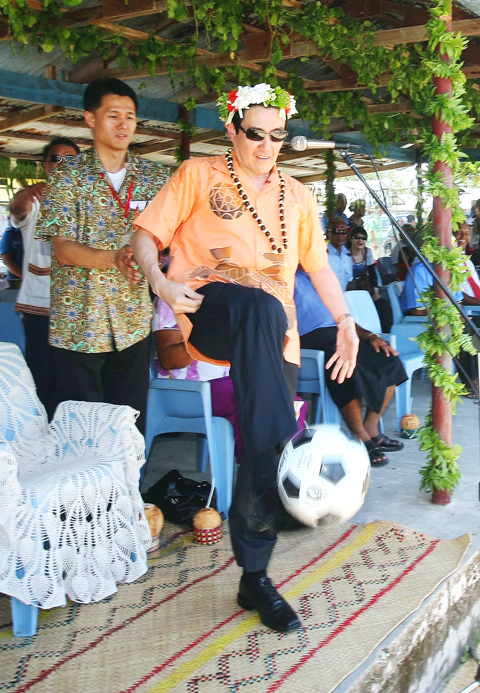President Ma Ying-jeou (馬英九) yesterday acknowledged Chinese Premier Wen Jiabao’s (溫家寶) comment on “yielding interests” to Taiwan, but said whether he meant it would hinge on China’s “attitude” during economic cooperation framework agreement (ECFA) negotiations with Beijing.
Ma said Wen’s remark was a gesture of goodwill, but his fundamental principle when negotiating with Beijing was that Taiwan’s interests come first.
“It does not mean we care only about Taiwan’s interests,” he said. “Sometimes when something benefits Taiwan, it also benefits the mainland. And sometimes when something benefits Taiwan, it is not necessarily harmful to the mainland.”

PHOTO: CNA
Ma made the remarks during a question-and-answer session at a press conference in Nauru yesterday afternoon. Ma is in the South Pacific on a six-nation visit.
During the National People’s Congress last week, Wen described Taiwan as “China’s brother.” He said that China would “let the people of Taiwan benefit” from tariff concessions and early harvest programs spelled out in the ECFA. He also said that “relevant arrangements” in the trade pact would help reassure Taiwanese farmers.
Ma yesterday said that he was happy to see Beijing realize the differences between Taiwan and “the mainland,” including the economy, development, population and tariffs. It was not true equality to ask both sides to be equal in these areas because of China’s size relative to Taiwan. However, genuine equality could be attained through proportionality, he said, and would be reflected in negotiations on tariffs, intellectual property rights (IPR) and investment protection.
Ma’s administration is seeking to sign an ECFA with Beijing in May or June. Both sides have agreed to address the issue of IPR protection during upcoming talks.
Ma said he was happy to see China wants Taiwan to benefit from the trade deal but whether this would happen depended on “the mainland’s attitude,” he said.
When asked about his thoughts on Wen’s description of Taiwan as “China’s brother,” Ma said people on both sides of the Taiwan Strait have the same roots, so the description “was not wrong.”
“But in Taiwan, the relationship between the government and the mainland operates under the constitution of the Republic of China,” he said. “Like I always say, the people on both sides of the Taiwan Strait belong to the Chinese nation.”

Taiwan is to commence mass production of the Tien Kung (天弓, “Sky Bow”) III, IV and V missiles by the second quarter of this year if the legislature approves the government’s NT$1.25 trillion (US$39.78 billion) special defense budget, an official said yesterday. Commenting on condition of anonymity, a defense official with knowledge of the matter said that the advanced systems are expected to provide crucial capabilities against ballistic and cruise missiles for the proposed “T-Dome,” an advanced, multi-layered air defense network. The Tien Kung III is an air defense missile with a maximum interception altitude of 35km. The Tien Kung IV and V

The disruption of 941 flights in and out of Taiwan due to China’s large-scale military exercises was no accident, but rather the result of a “quasi-blockade” used to simulate creating the air and sea routes needed for an amphibious landing, a military expert said. The disruptions occurred on Tuesday and lasted about 10 hours as China conducted live-fire drills in the Taiwan Strait. The Civil Aviation Administration (CAA) said the exercises affected 857 international flights and 84 domestic flights, affecting more than 100,000 travelers. Su Tzu-yun (蘇紫雲), a research fellow at the government-sponsored Institute for National Defense and Security Research, said the air

Taiwan lacks effective and cost-efficient armaments to intercept rockets, making the planned “T-Dome” interception system necessary, two experts said on Tuesday. The concerns were raised after China’s military fired two waves of rockets during live-fire drills around Taiwan on Tuesday, part of two-day exercises code-named “Justice Mission 2025.” The first wave involved 17 rockets launched at 9am from Pingtan in China’s Fujian Province, according to Lieutenant General Hsieh Jih-sheng (謝日升) of the Office of the Deputy Chief of the General Staff for Intelligence at the Ministry of National Defense. Those rockets landed 70 nautical miles (129.6km) northeast of Keelung without flying over Taiwan,

A strong continental cold air mass is to bring pollutants to Taiwan from tomorrow, the Ministry of Environment said today, as it issued an “orange” air quality alert for most of the country. All of Taiwan except for Hualien and Taitung counties is to be under an “orange” air quality alert tomorrow, indicating air quality that is unhealthy for sensitive groups. In China, areas from Shandong to Shanghai have been enveloped in haze since Saturday, the ministry said in a news release. Yesterday, hourly concentrations of PM2.5 in these areas ranged from 65 to 160 micrograms per cubic meter (mg/m³), and pollutants were